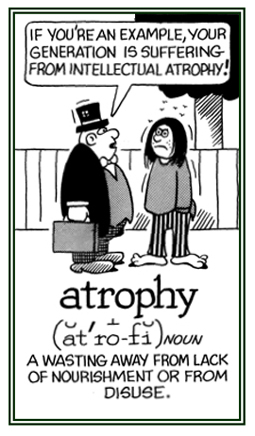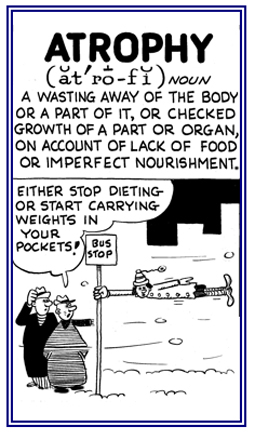tropho-, troph-, -trophy, -trophs, -trophically, -trophic, -trophous
(Greek: food, nutrition, nourishment; development)
Don't confuse this tropho-, -trophy element with tropo-, meaning "turn, turning," etc.
Atrophy is commonly caused by the lack of use; such as when a limb (arm, hand, etc.) has been immobilized in a plaster cast or by inadequate cell nutrition because of poor blood circulation.
Physicians are aware that atrophy may also take place during a prolonged serious illness, when the body needs to use up the protein reserves in the muscles.


Go to this Word A Day Revisited Index
so you can see more of Mickey Bach's cartoons.
Simon significantly atrophied during his bedridden illness.
Many elderly people have "sarcopenia", when the muscles are atrophying, because either they don't exercise at all or not adequately. People are never too old to exercise!
2. The degeneration, decline, or decrease, because of the lack of using something: Dr. Hughes, the professor, argued that freedom and independence of thought were progressively atrophying because too many people were simply ignoring their political rights.2. Any organism capable of self-nourishment by using inorganic materials as a source of nutrients and using photosynthesis or chemosynthesis as a source of energy, as most plants and certain kinds of bacteria: "An autotroph is an organism that produces organic compounds from carbon dioxide as a carbon source, using either light or reactions of inorganic chemical compounds as a source of energy."
"Autotrophs are a vital part of the world's food chain because they take energy from the sun or from inorganic sources and convert them into a form (organic molecules) that they use to carry out biological functions including cell growth, and which other organisms (called heterotrophs) utilize as food."
"Carnivorous animals ultimately rely on autotrophs because the energy and organic building blocks obtained from their prey comes from autotrophs which were eaten by the prey."
2. A reference to any organism for which environmental carbon dioxide is the only or main source of carbon in the synthesis of organic compounds by photosynthesis.
2. Needing only carbon dioxide or carbonates as a source of carbon and a simple inorganic nitrogen compound for metabolic synthesis>
3. Not requiring a specified exogenous factor for normal metabolism.
4. Self-nourishing; the ability of an organism to produce food from inorganic compounds.
- Carbon autotrophy, ability to assimilate carbon dioxide from the air.
- Nitrogen autotrophy, ability to assimilate nitrate or to do nitrogen fixation.
- Sulfur autotrophy, ability to assimilate sulfate.
2. A mutant organism, especially a microorganism, that has a nutritional requirement not shared by the parent organism.
3. A mutant microorganism that requires some nutrient that is not required by the organism (prototroph) from which the mutant was derived.
2. Requiring one or more specific substances for growth and metabolism that the parental organism was able to synthesize on its own. Used with respect to organisms; such as, strains of bacteria, algae, or fungi, that can no longer synthesize certain growth factors because of mutational changes.
Cross references of word families that are related directly, or indirectly, to: "food, nutrition, nourishment": alimento-; broma-; carno-; cibo-; esculent-; sitio-; Eating Crawling Snacks; Eating: Carnivorous-Plant "Pets"; Eating: Folivory or Leaf Eaters; Eating: Omnivorous.


